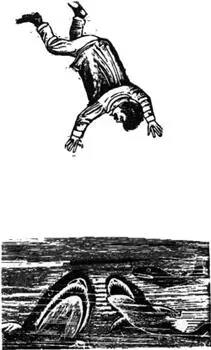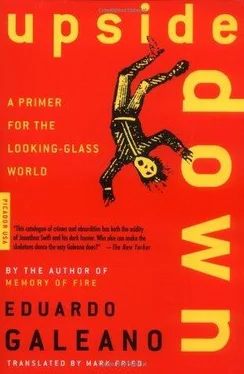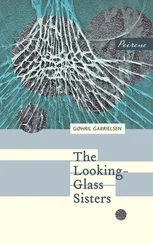The right to waste, privilege of a few, masquerades as freedom for all. Tell me how much you consume and I’ll tell you what you’re worth. This civilization won’t let flowers or chickens or people sleep. In greenhouses, flowers are subjected to twenty-four-hour lighting so they’ll grow faster. In egg factories, night is denied to the hens. And people, too, are condemned to insomnia, kept up by the anxiety of buying and the anguish of paying.
A Martyr
In the fall of 1998, in the center of Buenos Aires, a distracted pedestrian got flattened by a city bus. The victim was crossing the street while talking on a cell phone. While talking? While pretending to talk: the phone was a toy.
Magic
In the barrio of Cerro Norte, a poor suburb of the city of Montevideo, a magician gave a street performance. With a touch of his wand, he made a dollar bill sprout from his fist, then from his hat.
When the show was over, the magic wand disappeared. The next day, neighbors saw a barefoot child walking the streets, magic wand in hand. He tapped the wand on everything he came across and stood waiting.
Like many other children in the neighborhood, that nine-year-old boy liked to sink his nose into a plastic bag filled with glue. Once he explained why: “It takes me to another country.”
This way of life may not be very healthy, but it’s great for the pharmaceutical industry. People in the United States consume half the sleeping pills, tranquilizers, and other legal drugs sold in the world, as well as half the illegal drugs, which ain’t chicken feed considering that the United States makes up only 5 percent of the world’s population.
“Unhappy people, who live comparing themselves with others,” laments a woman in Montevideo’s barrio of Buceo. The pain of no longer being, of which the tango once sang, has made way for the shame of not having. A poor man is an object of pity. “When you have nothing, you think you’re worth nothing,” says a young man in the barrio of Villa Fiorito in Buenos Aires. And another, in the Dominican town of San Francisco de Macorís, adds, “My brothers work for brand names. They live to buy labels, and they work from dawn to dusk to keep up with the payments.”
It’s a Joke/2
A car crashes on the outskirts of Moscow. The driver crawls out of the wreckage and moans: “My Mercedes … My Mercedes…”
Somebody says to him: “Buddy, who cares about the car! Don’t you see your arm is missing?”
One look at his bleeding stump, and the man cries: “My Rolex! My Rolex!”
The invisible violence of the market: diversity is the enemy of profitability, and uniformity rules. Mass production on a gigantic scale imposes its obligatory patterns of consumption everywhere. More devastating than any single-party dictatorship is the tyranny of forced uniformity. It imposes on the entire world a way of life that reproduces human beings as if they were photocopies of the consummate consumer.
The consummate consumer is a man who sits still. This civilization, which confuses quantity with quality, also confuses obesity with good nutrition. According to the British scientific journal the Lancet, over the past decade “severe obesity” has increased by nearly 30 percent among young people in the most-developed countries. Among U.S. children, obesity has increased 40 percent in the past sixteen years, according to a recent study by the Health Sciences Center of the University of Colorado. The country that invented “lite,” “diet,” and “fat-free” foods has the most fat people in the world. The consummate consumer gets out of his car only to work and to watch television. He spends four hours a day sitting in front of the small screen, devouring plastic.
It’s No Joke/2
In the spring of 1998 in Vienna, a newborn perfume is baptized. TV cameras record the ceremony, held in the vault of the Bank of Austria. The infant answers to the name “Cash” and she exudes the exciting fragrance of money. More baptismal parties are planned in Germany at the main offices of Deutsche Bank and in Switzerland at the Union des Banques Suisses.
“Cash” can be bought only on the Internet or in the most exclusive boutiques. “We’d like it to be the Ferrari of perfumes,” say the creators.
Garbage disguised as food is colonizing palates everywhere and annihilating local cooking traditions in the process. Fine dining, the joy of eating, cultivated and diversified over thousands of years in some countries, constitutes a collective patrimony that finds its way to everyone’s hearth, not only to the tables of the rich. Such traditions, such signs of cultural identity, such celebrations of life are being steamrollered by the globalization of hamburgers, the dictatorship of fast food. The worldwide Coca-Colonization of food, successfully imposed by McDonald’s, Burger King, and similar factories, violates cooking’s right to self-determination — a sacred right, since the mouth, as we know, is one of the doorways to the soul.

The 1998 soccer World Cup confirmed, among other things, that MasterCard tones muscles, Coca-Cola offers eternal youth, and a good athlete can’t get by without a shot of McDonald’s fries. The golden arches were carried as a standard during the recent conquest of Eastern Europe. When the first McDonald’s opened with pomp and ceremony in Moscow in 1990, the line outside symbolized the victory of the West as eloquently as the crumbling of the Berlin Wall.
It is a sign of the times that this company, which embodies the virtues of the free world, denies its employees the freedom to join a union. McDonald’s thus violates a legally sanctioned right in many countries in which it operates. In 1997, a handful of workers, members of what the company calls the McFamily, tried to form a union in Montreal; the restaurant closed its doors. A year later, a group of employees in a small city near Vancouver actually succeeded, a feat worthy of the Guinness Book of World Records.
In 1996, two British environmental activists, Helen Steel and David Morris, sued McDonald’s for mistreating its workers, destroying nature, and manipulating the emotions of children. The company’s employees are poorly paid, their working conditions are awful, and they can’t unionize. Tropical forests are razed and indigenous peoples are run off their lands to produce meat for its hamburgers. What’s more, its multimillion-dollar advertising campaigns threaten public health by enticing children to desire food of questionable nutritional value. The lawsuit, which at first seemed like a mosquito bite on an elephant’s back, had unexpected repercussions, helped inform public opinion, and is turning into a long and costly headache for a company accustomed to unchallenged power. After all, power is what all this is about. In the United States, McDonald’s employs more people than the steel industry, and in 1997 its sales were greater than the total exports of Argentina and Hungary combined. Its star product, the Big Mac, is so very important that in several countries its price is used as a unit of value for international financial transactions: virtual food orienting the virtual economy. According to McDonald’s advertising in Brazil, the Big Mac is like love. Two bodies, aroused by cheese and pickle, embrace and kiss, oozing special sauce, while their hearts of onion thrill to the green hope of lettuce.
Cheap prices, quick service: the human machinery gasses up and goes right back to work. The German writer Günter Wallraff worked in one of those gas stations in 1983, a McDonald’s in the city of Hamburg, which is certainly innocent of the things being done in its name. He found himself toiling at a feverish pace without a break, spattered with boiling oil: once thawed, the hamburgers have ten minutes to live. After that, they stink. You’ve got to get them on the stove right away. The fries, the vegetables, the meat, the fish, the chicken, it all has the same taste, an artificial flavor dictated by the chemical industry, which also supplies the colorants that hide the meat’s 25 percent fat content. This garbage is our most successful millennial meal. Its chefs study at Hamburger University in Elk Grove, Illinois. But the owners of the business, according to well-informed sources, prefer elegant restaurants serving the finest dishes of what has come to be called “ethnic food”: Japanese, Thai, Persian, Javanese, Indian, Mexican … Democracy is nothing to laugh at.
Читать дальше












